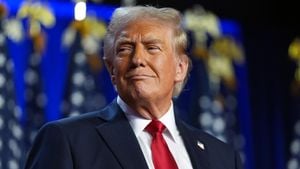Donald Trump, the highly polarizing figure of American politics, once again finds himself amid legal and operational battles as he maneuvers through the early stages of his presidential term. Following his recent elections success, he is faced with the aftermath of significant legal and political challenges stemming from his previous administration, particularly surrounding his actions post-2020 election.
On one hand, Trump was handed legal victories when federal prosecutors, led by Jack Smith, moved to dismiss charges against him related to federal election interference. These motions indicated the challenging position for the Justice Department under the current legal framework which leaves much ambiguity surrounding presidential accountability for alleged misconduct. Smith's rationale was based on precedents, arguing it was inappropriate to charge Trump when he is viewed as a sitting president, emphasizing, "We have concluded to treat Mr. Trump as the current president."
While this strategy may shield Trump legally, the echo of the alleged "fake electors scheme" and the January 6 Capitol riot still loom large over his presidency.
Meanwhile, as his administration gears up, Trump’s focus turns to cabinet appointments. His allies and advisors are busy filling positions with figures who are controversial yet aligned with Trump's vision, making it clear he is not backing down from his populist and nationalistic roots. Some prominent names floated for high-profile roles include Robert F. Kennedy Jr. for the Secretary of Health and Human Services, but not without pushback from within the Republican senators who express discomfort over some of these selections.
The prospect of Trump utilizing recess appointments to bypass congressional approval has become another talking point of concern. Reports suggest he may attempt to forcibly adjourn Congress, creating waves of uncertainty across the political spectrum. This has spurred discussions on what this could mean for the separation of powers and the potential ramifications of such actions. Also, as Trump navigates these waters, GOP senators are being urged to act quickly to affirm his cabinet picks to prevent such extreme maneuvers.
Recently, the conversation around Trump's treatment of transgender members of the military has sparked controversy. His intention to potentially reverse policies protecting trans troops—from the Obama era—has unleashed outrage from LGBTQ advocates and allies. This move has been framed by many as another attempt by Trump to rally his base, echoing sentiments from his previous term, where culture war issues were prevalent.
While Trump consolidates power again, significant consequences of his past tenure are still very much relevant. His decisions have already led to shadows of family separations with people who've been deported under aggressive immigration policies. Alarmingly, these earlier ramifications directly tie back to his post-election actions and the aggressive rhetoric he employed as he claimed widespread voter fraud.
Looking back, numerous actions taken pre- and post-election have been condemned by political opponents, with many viewing them as dangerous to democracy. The insurrection on January 6, 2021, still haunts the halls of Congress, serving as stark reminders of the divisive atmosphere Trump's claims perpetuated. According to some analysts, failure to properly address these elements may lead to historical narratives framing Trump’s tenure as primarily harmful to the integrity of American political institutions.
Despite the challenges and controversies, Trump continues to flaunt his influence within the Republican Party, showcasing his ability to captivate large segments of voters. The repeated emphasis on grievances from the 2020 election appears to be central to his strategy moving forward.
With his recent legal wins buoying his confidence, the continued debates over cabinet selections, military policies, and attempts to reassert control over Congress suggest the tumultuous nature of his new administration could mirror the chaos of the previous term. Observers remain eager to see how these dynamics will play out, particularly as Trump seeks to solidify his authority within the party and electoral base during these pivotal early months.
For many Americans, the stakes remain high, as they come to grips with either the resurgence of Trumpism or the prospect of political opposition rallying strength to counteract his vision. This complex interplay highlights not only the current political climate but also shapes the future of governance and social relations within the United States.



